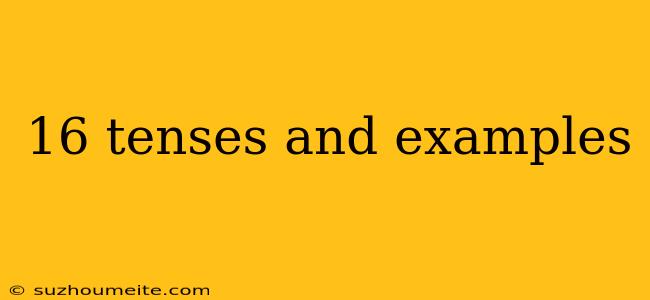Tenses in English Grammar
In English grammar, tenses are used to express the time of an action or event. There are 16 tenses in total, each with its own unique form and function. Understanding the different tenses is essential to communicate effectively in English. Here are the 16 tenses and their examples:
Present Tenses
1. Present Simple
- Form: Base form of the verb (e.g., I go, you go, he/she/it goes, we go, they go)
- Example: I go to school every day.
2. Present Continuous
- Form: Be (am/is/are) + verb-ing (e.g., I am going, you are going, he/she/it is going, we are going, they are going)
- Example: I am going to the gym tonight.
3. Present Perfect
- Form: Has/have + past participle of the verb (e.g., I have gone, you have gone, he/she/it has gone, we have gone, they have gone)
- Example: I have gone to the movies three times this week.
4. Present Perfect Continuous
- Form: Has/have been + verb-ing (e.g., I have been going, you have been going, he/she/it has been going, we have been going, they have been going)
- Example: I have been going to the library every day for a month.
Past Tenses
5. Past Simple
- Form: Past tense of the verb (e.g., I went, you went, he/she/it went, we went, they went)
- Example: I went to the beach last weekend.
6. Past Continuous
- Form: Was/were + verb-ing (e.g., I was going, you were going, he/she/it was going, we were going, they were going)
- Example: I was going to the store when I saw my friend.
7. Past Perfect
- Form: Had + past participle of the verb (e.g., I had gone, you had gone, he/she/it had gone, we had gone, they had gone)
- Example: I had gone to the party before you arrived.
8. Past Perfect Continuous
- Form: Had been + verb-ing (e.g., I had been going, you had been going, he/she/it had been going, we had been going, they had been going)
- Example: I had been going to the gym for three months before I got injured.
Future Tenses
9. Future Simple
- Form: Will + base form of the verb (e.g., I will go, you will go, he/she/it will go, we will go, they will go)
- Example: I will go to the party tonight.
10. Future Continuous
- Form: Will be + verb-ing (e.g., I will be going, you will be going, he/she/it will be going, we will be going, they will be going)
- Example: I will be going to the concert tomorrow night.
11. Future Perfect
- Form: Will have + past participle of the verb (e.g., I will have gone, you will have gone, he/she/it will have gone, we will have gone, they will have gone)
- Example: I will have gone to the store by the time you arrive.
12. Future Perfect Continuous
- Form: Will have been + verb-ing (e.g., I will have been going, you will have been going, he/she/it will have been going, we will have been going, they will have been going)
- Example: I will have been going to the library for three hours by the time I finish my assignment.
Other Tenses
13. Conditional Simple
- Form: Would + base form of the verb (e.g., I would go, you would go, he/she/it would go, we would go, they would go)
- Example: I would go to the beach if I had a car.
14. Conditional Continuous
- Form: Would be + verb-ing (e.g., I would be going, you would be going, he/she/it would be going, we would be going, they would be going)
- Example: I would be going to the movies if I had the time.
15. Conditional Perfect
- Form: Would have + past participle of the verb (e.g., I would have gone, you would have gone, he/she/it would have gone, we would have gone, they would have gone)
- Example: I **
